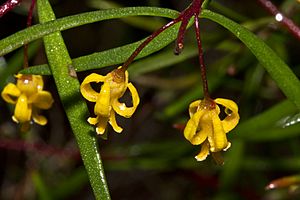Nodding geebung facts for kids
Quick facts for kids Nodding geebung |
|
|---|---|
 |
|
| In Agnes Banks | |
| Conservation status | |
| Scientific classification |
|
| Kingdom: | Plantae |
| Clade: | Tracheophytes |
| Clade: | Angiosperms |
| Clade: | Eudicots |
| Order: | Proteales |
| Family: | Proteaceae |
| Genus: | Persoonia |
| Species: |
P. nutans
|
| Binomial name | |
| Persoonia nutans |
|
| Script error: The function "autoWithCaption" does not exist. | |
| Synonyms | |
|
|
Script error: No such module "Check for conflicting parameters".

The nodding geebung, known scientifically as Persoonia nutans, is a special plant found only in a small part of the Sydney area in New South Wales, Australia. This means it is endemic to that region. It belongs to the plant family called Proteaceae.
This plant is a type of shrub that can grow upright or spread out. It has long, narrow leaves and pretty yellow flowers. These flowers hang downwards on their little stalks, which is why it's called the "nodding" geebung!
Contents
What the Nodding Geebung Looks Like
The nodding geebung is a shrub that usually grows to be about 0.5 to 1.5 meters (about 1.5 to 5 feet) tall. It has smooth bark and its younger branches are covered in soft, greyish hairs.
Leaves and Flowers
The leaves of this plant grow one after another along the stem. They are long and thin, like a line, measuring between 10 and 45 millimeters (about 0.4 to 1.8 inches) long. They are also quite narrow, only about 1.0 to 1.8 millimeters wide, and their edges curve slightly downwards.
The yellow flowers grow in groups, either where a leaf meets the stem or at the ends of the branches. Sometimes, there can be up to forty flowers in one group! These flower groups can be quite long, up to 250 millimeters (about 10 inches). After the plant flowers, this part of the stem often grows into a leafy shoot.
Each flower hangs down on its own little stalk, called a pedicel, which is about 7 to 12 millimeters long. There is usually a small leaf right at the base of each flower stalk. The flower parts, called tepals, are yellow and smooth. They are about 8.5 to 11 millimeters long.
Fruit and Flowering Time
The nodding geebung mostly flowers from November to April. After flowering, it produces a green fruit with purple marks. This fruit is a type of drupe, which means it has a fleshy outer part and a hard pit or stone inside, like a peach or a plum.
Where the Nodding Geebung Lives
The nodding geebung grows in woodlands and forests. You can find it on the Cumberland Plain, which is an area located between Sydney and the Blue Mountains. Its range stretches from Richmond in the north down to Macquarie Fields in the south.
Why the Nodding Geebung Needs Our Help
Sadly, the nodding geebung is an "endangered" species. This means it is at a very high risk of disappearing forever if we don't protect it. Both the Australian Government and the New South Wales Government have laws to protect this plant. There is even a special plan to help it recover and survive.
Threats to the Plant
There are several reasons why the nodding geebung is in danger:
- Loss of habitat: People are clearing land for buildings and other developments. This destroys the places where the geebung naturally grows.
- Fires: The wrong types of fires, or fires happening too often, can harm the plants and stop them from growing back properly.
- Habitat damage: The places where the geebung lives are sometimes damaged by things like rubbish dumping. This makes it harder for the plants to thrive.
By understanding these threats, we can work to protect this unique Australian plant for future generations.
 | DeHart Hubbard |
 | Wilma Rudolph |
 | Jesse Owens |
 | Jackie Joyner-Kersee |
 | Major Taylor |


